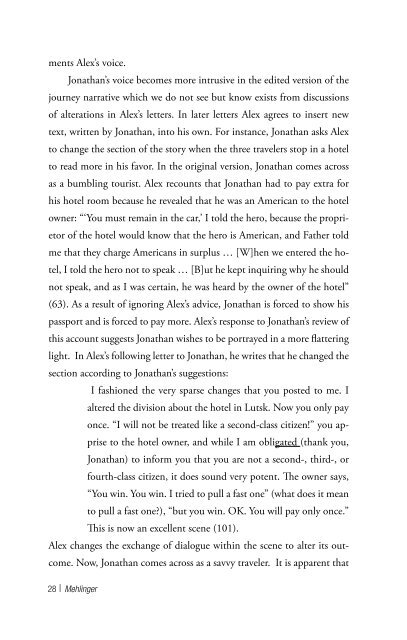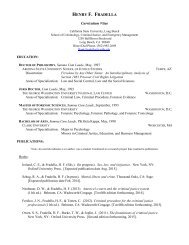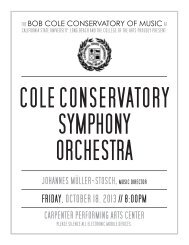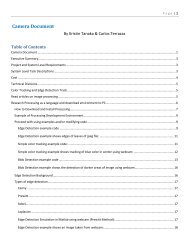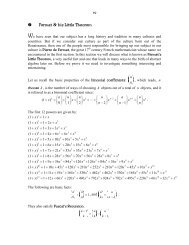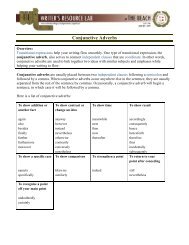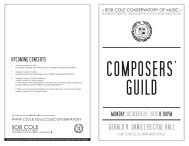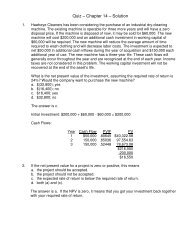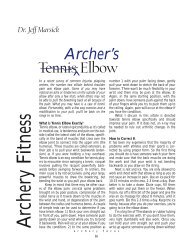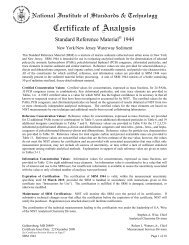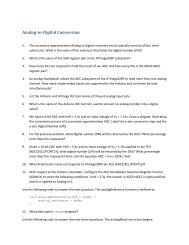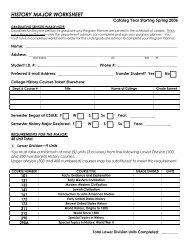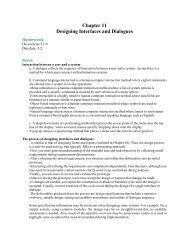Untitled - California State University, Long Beach
Untitled - California State University, Long Beach
Untitled - California State University, Long Beach
Create successful ePaper yourself
Turn your PDF publications into a flip-book with our unique Google optimized e-Paper software.
ments Alex’s voice.<br />
Jonathan’s voice becomes more intrusive in the edited version of the<br />
journey narrative which we do not see but know exists from discussions<br />
of alterations in Alex’s letters. In later letters Alex agrees to insert new<br />
text, written by Jonathan, into his own. For instance, Jonathan asks Alex<br />
to change the section of the story when the three travelers stop in a hotel<br />
to read more in his favor. In the original version, Jonathan comes across<br />
as a bumbling tourist. Alex recounts that Jonathan had to pay extra for<br />
his hotel room because he revealed that he was an American to the hotel<br />
owner: “‘You must remain in the car,’ I told the hero, because the proprietor<br />
of the hotel would know that the hero is American, and Father told<br />
me that they charge Americans in surplus … [W]hen we entered the hotel,<br />
I told the hero not to speak … [B]ut he kept inquiring why he should<br />
not speak, and as I was certain, he was heard by the owner of the hotel”<br />
(63). As a result of ignoring Alex’s advice, Jonathan is forced to show his<br />
passport and is forced to pay more. Alex’s response to Jonathan’s review of<br />
this account suggests Jonathan wishes to be portrayed in a more flattering<br />
light. In Alex’s following letter to Jonathan, he writes that he changed the<br />
section according to Jonathan’s suggestions:<br />
I fashioned the very sparse changes that you posted to me. I<br />
altered the division about the hotel in Lutsk. Now you only pay<br />
once. “I will not be treated like a second-class citizen!” you apprise<br />
to the hotel owner, and while I am obligated (thank you,<br />
Jonathan) to inform you that you are not a second-, third-, or<br />
fourth-class citizen, it does sound very potent. The owner says,<br />
“You win. You win. I tried to pull a fast one” (what does it mean<br />
to pull a fast one?), “but you win. OK. You will pay only once.”<br />
This is now an excellent scene (101).<br />
Alex changes the exchange of dialogue within the scene to alter its outcome.<br />
Now, Jonathan comes across as a savvy traveler. It is apparent that<br />
28 | Mehlinger<br />
Jonathan has written the actual text Alex conveys in the letter, because<br />
at one point Alex has to interject to ask Jonathan what the phrase “I<br />
pulled a fast one” means. We can also see that Alex is easily influenced<br />
by Jonathan, whose opinion he holds in very high regard. Despite the<br />
blatant revision of fact that Jonathan requests, Alex does not protest. In<br />
fact, he goes so far as to conclude, “This is now an excellent scene.” By<br />
editing Alex’s text, Jonathan’s voice alters Alex’s voice within the text by<br />
asserting his own.<br />
Jonathan also has strong influence over Alex’s everyday usage of the<br />
English language. When first introduced to Alex, any English speaking<br />
reader will be initially jarred by his strange vocabulary choices and grammar.<br />
Mihai Mindra addresses Alex’s unique language in the context of the<br />
time and place he grew up: “The vocabulary used by Alex, in his story<br />
of the trip and his post-trip letters to Jonathan Safran, seems to indicate<br />
Foer’s expertise in pre-1989 East Communist mechanical perception of<br />
Western culture dictated by ideological Iron Curtains” (Mindra 52). According<br />
to Mindra, Alex’s bizarre interpretation of English is an accurate<br />
representation of how Western languages, like English, were taught in<br />
the Communist Block before the Berlin Wall’s fall. Mindra explains that<br />
it was common for English to be taught “according to academically out<br />
of fashion dictionaries and East European textbooks using high standard,<br />
archaic, non-colloquial dead lingos” (52). As the novel progresses, Alex’s<br />
English abilities improve, which can be documented in his letters to Jonathan<br />
as time passes.<br />
In Alex’s very first letter to Jonathan, he begins by apologizing for<br />
his usage of English, writing in the second sentence, “Like you know,<br />
I am not first rate with English” (Foer 23). As he continues, he reveals<br />
that Jonathan has made efforts to help him with his English: “I fatigued<br />
the thesaurus you presented me, as you counseled me to, when my<br />
words appeared too petite, or not befitting” (23). The correspondence<br />
Mehlinger | 29


